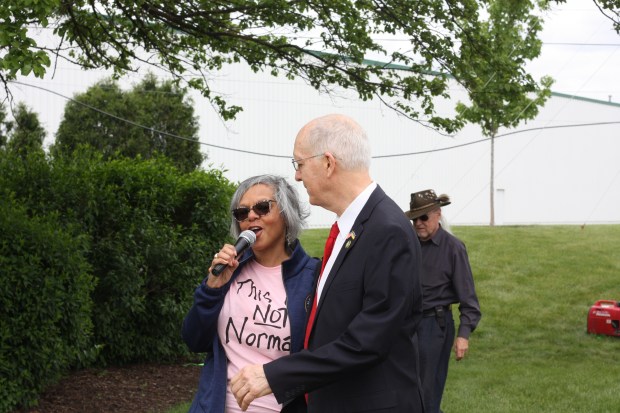Aurora City Council members Tuesday voted to forcibly annex a property near the city’s West Side where Kane County recently approved a solar farm development opposed by the city.
City staff have previously said the proposed solar farm, planned along the west side of Barnes Road and north of the Burlington Northern Santa Fe railroad tracks, does not match the city’s land use plan for the area, which calls for estate-style housing.
Now that the land is within city limits, the city has control over its zoning, effectively stopping the solar farm project.
State law allows a city or village to forcibly bring an area of 60 acres or less under its control if the land is completely surrounded by other local political boundaries such as city or village limits or a county forest preserve district, according to city staff’s report on the ordinance to forcibly annex the property.
To completely surround the site of the roughly 40-acre planned solar farm, Aurora aldermen approved in a 9-1 vote an ordinance to annex a portion of the existing BNSF railroad property that runs along the site’s southern border.
Aldermen then voted 9-1 to approve the ordinance forcibly annexing the proposed solar farm site. The ordinance also annexes a vacant parcel of land near the railroad and a nearby religious institution, according to the staff report.
Ald. John Laesch, at large, was the sole vote against the forced annexation and related BNSF railway annexation. After the meeting, he said the land is not suitable for the kind of development the city has planned to go there because the land frequently floods and the nearby railroad is likely to create noise that potential residents would not enjoy.
“It’s never going to be developed, and we’re spending a lot of money on legal fees now to annex it,” Laesch said.
Those who proposed the solar farm made similar arguments to the Kane County Board at a meeting earlier this month.
The proposed solar farm site was previously in unincorporated Kane County, meaning the county had land-use zoning authority over the property. However, since the site was within a mile-and-a-half of the Aurora city limits, it was also within the city’s planning jurisdiction.
Since the Aurora City Council previously voted 10-1 to protest the development, the Kane County Board needed a supermajority vote to approve the project. Kane County Board members met that mark, voting 20-2 in favor of the solar farm.
Aurora city officials have said their concerns about the project are not an objection to solar power as a whole, as the city currently has a number of ongoing solar projects. However, the location has been planned to be estate-style housing since at least 2002, city officials previously said.
Plus, the city should not go against its own plans and settle for just any proposed land use just because the land has not been developed, Aurora Chief Management Officer Alex Alexandrou previously said.
The city already has five estate-style subdivisions west of Orchard Road.
Ben Jacobi, the attorney for the solar project’s developer RLC Ventures LLC, which made the proposal through RPIL Solar 10 LLC, previously told the Kane County Board he would be challenging the forced annexation if it passed the Aurora City Council.
A ComEd transmission line runs through the property, and that land would also need to be annexed before the solar project property would be fully surrounded by the city, he said.
When Laesch asked about a potential lawsuit on the issue at a recent Aurora City Council Committee of the Whole meeting, Alexandrou told aldermen that city officials have “assessed” their situation regarding the annexation, and they feel they “are on solid ground” legally.
rsmith@chicagotribune.com



